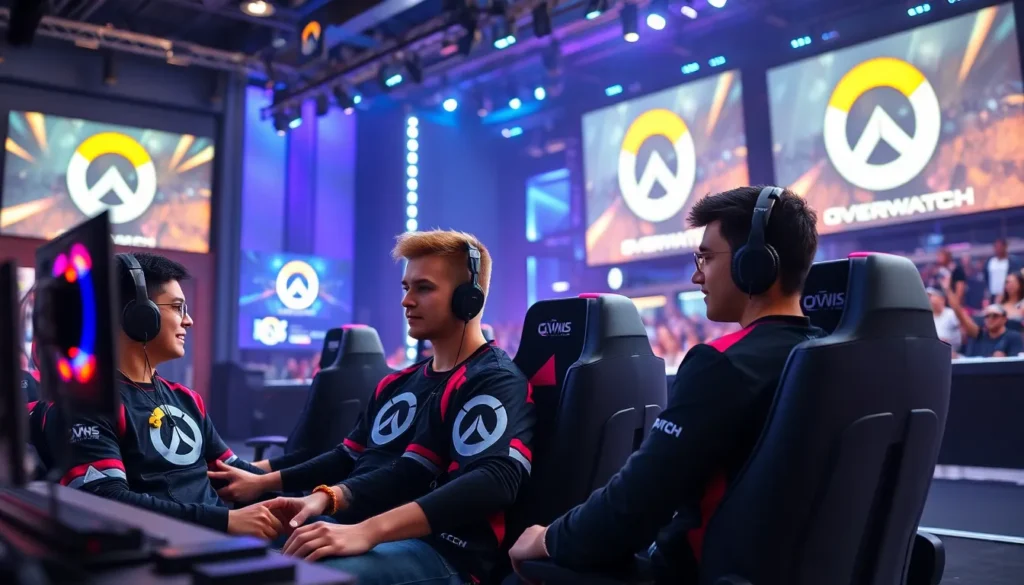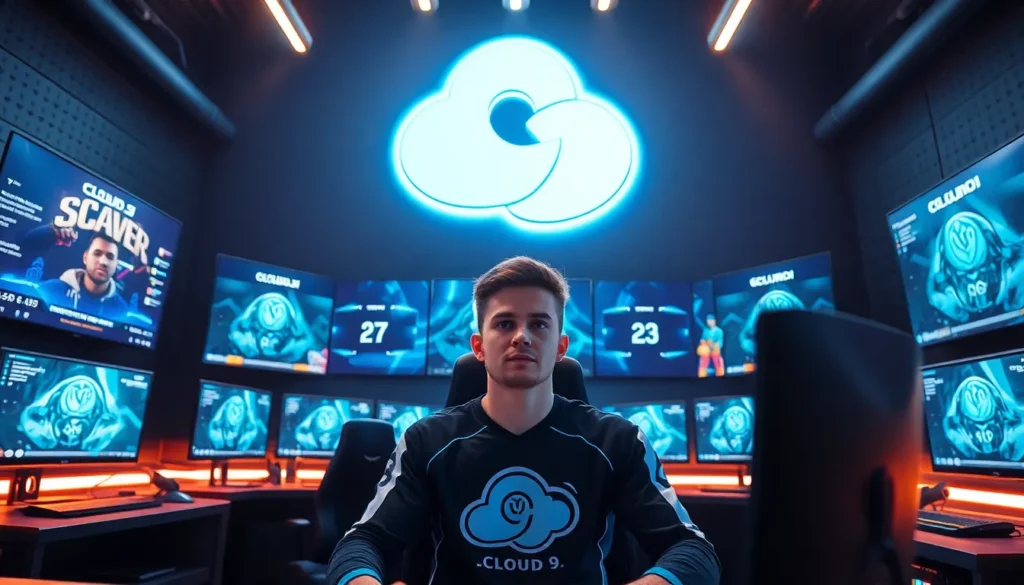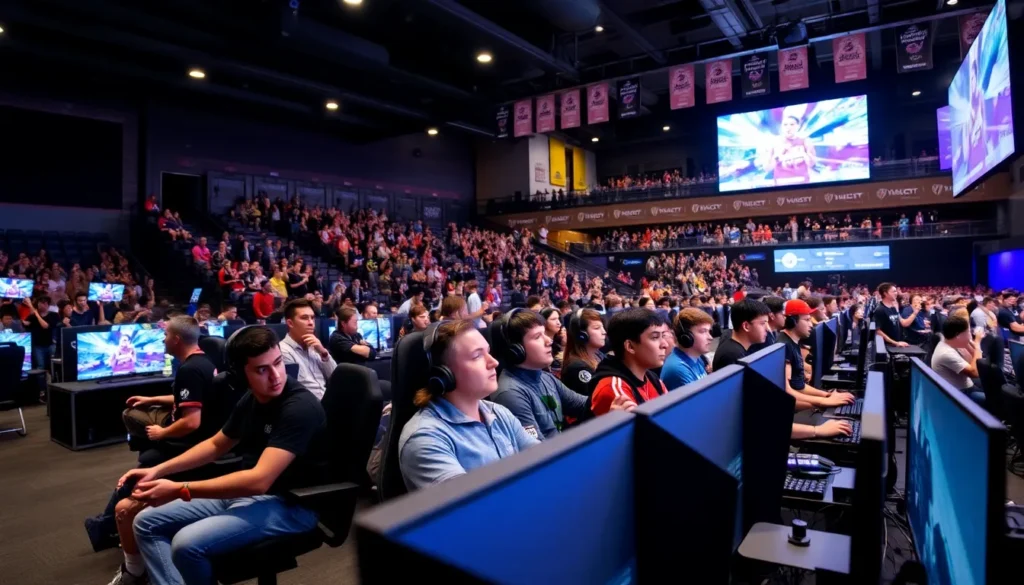Table of Contents
ToggleEsports clubs are transforming the landscape of competitive gaming, bringing together players, fans, and communities in ways that were once unimaginable. As the popularity of esports continues to soar, these clubs serve as hubs for talent development, social interaction, and strategic collaboration. They provide a platform for gamers to hone their skills, compete in tournaments, and connect with like-minded individuals who share their passion.
With the rise of professional leagues and sponsorships, esports clubs are not just about playing games; they’re about building careers and fostering teamwork. Players gain access to resources, coaching, and networking opportunities that can propel them to new heights. As the gaming industry evolves, the role of these clubs becomes increasingly vital, shaping the future of esports and its place in mainstream culture.
Overview of Esports Clubs
Esports clubs serve as vital components in the competitive gaming environment. They foster community engagement, professional development, and facilitate opportunities for aspiring gamers.
Definition and Purpose
Esports clubs are organized groups focused on competitive gaming. They unite players with similar interests and skills, enabling collaboration and practice. These clubs provide a structured environment for members to enhance their gaming abilities. They often offer resources such as coaching, training sessions, and strategic workshops. Participation in tournaments is prevalent, promoting teamwork and competition among members. Clubs also aim to build a supportive community, facilitating social interaction and networking opportunities.
Growth of Esports Clubs
The growth of esports clubs has been remarkable in recent years. The number of clubs increased by over 30% from 2020 to 2023. This surge is driven by the rising popularity of esports and greater accessibility to gaming resources and technology. More than 500 esports clubs exist worldwide, catering to various gaming titles and communities. Colleges and universities are also establishing esports clubs, integrating competitive gaming into their athletic programs. Increased sponsorships and partnerships further contribute to the sustainability and expansion of these clubs, indicating a promising future for esports organizations.
Popular Esports Clubs

Numerous esports clubs have gained recognition for their achievements and contributions to the gaming community. Several clubs stand out due to their commitment to excellence in competitive gaming.
Notable Club Examples
- Team Liquid: Founded in 2000, Team Liquid has grown into a prominent esports organization featuring teams across various games, including League of Legends, Dota 2, and Counter-Strike: Global Offensive. Known for their strategic prowess and strong fan base, they have secured significant sponsorship deals.
- Cloud9: Established in 2013, Cloud9 has made headlines in multiple esports titles, particularly in League of Legends and Valorant. Their commitment to player development and marketing strategies sets them apart in the industry.
- FaZe Clan: This club, recognized for its significant cultural influence, excelled in Call of Duty and Fortnite. Founded in 2010, FaZe Clan melds entertainment and competitive gaming, attracting millions of followers and lucrative brand partnerships.
- G2 Esports: G2 Esports, founded in 2013, has distinguished itself by capturing championships in games like League of Legends and Rainbow Six Siege. Their innovative approach to team building and community engagement has garnered widespread respect.
- T1: Originating in 2015 as SK Telecom T1, this club achieved fame in League of Legends, holding multiple world championship titles. Their strategic gameplay and investment in talent development contribute to their lasting success.
Achievements and Milestones
- Tournaments Won: Over the years, clubs have collectively won thousands of tournaments, contributing to millions in prize money. For example, Team Liquid won over $36 million in total prize earnings by 2021.
- Championship Titles: Notable achievements include G2 Esports winning the 2019 Mid-Season Invitational. Their success illustrates the competitive edge and skills that clubs cultivate among their players.
- Sponsorship Growth: The increase in sponsorships, such as Team Liquid’s deal with Monster Energy, highlights the commercial viability of esports clubs. This aspect boosts revenue and ensures financial sustainability in the competitive landscape.
- Player Development: Many clubs prioritize developing professional athletes, with training programs yielding top-tier talent. Programs and coaching have led to numerous players rising to stardom in their respective games.
- Community Engagement: Esports clubs often host events and tournaments, fostering community interaction. By organizing LAN parties and fan meet-ups, they enhance the overall gaming experience and strengthen their brand presence.
Structure of Esports Clubs
Esports clubs feature a defined structure that enhances player performance and community engagement. Key elements include team composition and management roles.
Team Composition
Team composition consists of various roles essential for a balanced gameplay experience. These roles typically include:
- Players: Core members who participate in competitions. They often specialize in different areas such as strategy, leadership, or specific game mechanics.
- Substitutes: Backup players ready to fill in when primary players cannot compete. This ensures team stability and preparedness.
- Analysts: Professionals analyzing gameplay data and opponent strategies. Their insights help improve team performance.
- Support Staff: Includes psychologists, nutritionists, and trainers. They optimize player wellness and performance.
Each role contributes to the club’s overall effectiveness, fostering an environment for skill development and teamwork.
Management and Coaching
Management and coaching play pivotal roles in establishing an esports club’s direction. Key positions include:
- Team Manager: Oversees daily operations, handles logistics, and coordinates communication between players and staff. This role ensures smooth functioning during practices and tournaments.
- Head Coach: In charge of developing strategies, conducting training, and evaluating player performance. The head coach molds the team’s competitive edge.
- Assistant Coaches: Support the head coach by focusing on individual player development or specific game aspects. This tailored coaching enhances overall team performance.
Together, management and coaching create a structured framework that drives successful practices and competitive results.
Community and Culture within Esports Clubs
Esports clubs cultivate a vibrant community and culture that enhances the competitive gaming experience. These organizations foster connections between players, fans, and sponsors, creating an inclusive environment that values engagement and growth.
Fan Engagement
Fan engagement plays a pivotal role in the success of esports clubs. Clubs actively involve fans through various initiatives that strengthen their connection to the community. Events, such as watch parties, tournaments, and meet-and-greets, create opportunities for fans to interact directly with players. Merchandise sales, exclusive content, and social media interactions also enhance fan loyalty. Clubs utilize platforms like Twitch and Discord to foster real-time communication, allowing fans to follow their favorite teams closely.
Player Resources and Development
Esports clubs provide extensive resources for players, focusing on both skill enhancement and personal growth. Clubs often include access to professional coaching, tailored training programs, and analytical tools. These resources help players refine their strategies, improve teamwork, and develop essential skills. Additionally, clubs organize workshops and seminars featuring industry experts, offering guidance on mental health, nutrition, and career management. This commitment to player development contributes to a culture of excellence and sets the foundation for long-term success in esports.
Esports clubs are redefining the competitive gaming landscape by creating vibrant communities where players can thrive. Their structured approach to team management and player development fosters not only individual skill but also teamwork and collaboration.
As these clubs continue to grow in number and influence they play a pivotal role in shaping the future of esports. By bridging the gap between players fans and sponsors they enhance the overall gaming experience and promote a culture of inclusivity and engagement.
The commitment of these organizations to excellence and community building ensures their lasting impact on the esports industry. With the increasing popularity of competitive gaming esports clubs are set to remain at the forefront of this exciting evolution.







